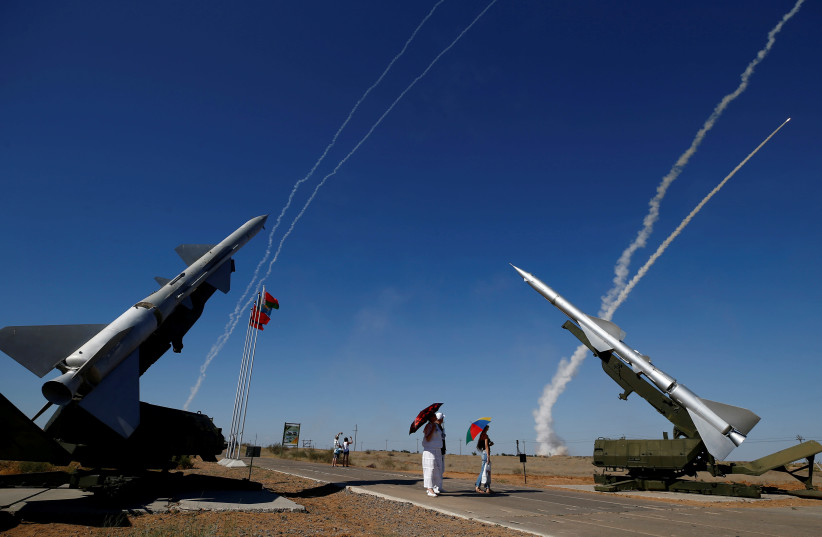Amid the problems with his inner circle, Assad must also weigh new reports that assert his air defense systems are failing against attacks.
SETH J. FRANTZMAN

Syria’s regime has faced several embarrassments recently, including criticism from a wealthy insider and leaks claiming its air defense systems have failed to prevent attacks. Rami Makhlouf, a wealthy businessman and cousin of President Bashar al-Assad, has expressed rare criticism of the regime in a recent video.
Makhlouf claimed that his telecom company, which has more than 10 million users, pays taxes. This was apparently a reply to critics who claims he avoids taxes. He says in his unprecedented video, which has rare criticism of the regime, that he is willing to pay his share. He says his company’s employees have been ill-treated, arrested by the state, amid pressure from Damascus. How important is it if Assad loses this key financial ally and part of his family. It could ruffle feathers with Moscow and Tehran and others because the Assad regime is already on shaky economic foundations after a decade of civil war.
A look back at how Makhlouf became such a key to the regime. In 2011 when protests broke out in Dara’a in southern Syria they targeted not only Assad but the phone company Syriatel. Makhlouf was owned by Makhlouf. Already at the time there were questions about whether Makhlouf was a “liability” for the regime. Makhlouf was 41 at the time, a symbol of power, privilege and a wealthy family clan around Assad, according to a New York Times profile that year. Makhlouf and his brother Hafez Makhlouf became key insiders. His brother worked in state security. Rami grew wealthy through contracts wth Egyptian mobile phone companies and Syriatel.
The US sought to designate Makhlouf for his corrupt activities in 2008. US diplomatic cables from the US embassy in Damascus suggested highlighting his role in electricity, oil and telecommunicatons. “Makhlouf has used government instruments to squeeze out legitimate businessmen, receive lucrative public contracts,” the US diplomats said. At the time the US was still seeking to work with the Assad regime and wanted to cultivate regime moderates who could be “reformers” and remove Makhlouf. The US said that he was undermining Syria’s economy and harming “reform efforts.”
After the US designated him in February 2008 for his role in corruption. The Iranians ran to rescue Makhlouf after the US targeted hm. In 2008 Iranian Vice-President Parviz Davudi met with him to tell him that Tehran would step in if US sanctions hurt his empire. Tehran proposed partnerships in cement factories. Makhlouf was also involved in airline investment initiatives. The increasing role of the Makhloufs brought them unwanted attention from critics and from within the regime. The 2020 break is not the first time they ran into troubles with Assad. In 2005 they also had to leave the country “for a number of months,” US diplomats said in cables to Washington.
Makhlouf’s corruption and role in the regime’s economy was a point of discussion throughout the Syrian conflict, with suggestions that he had overplayed his hand. Questions about his role in getting around sanctions were frequently raised. It appears he was increasingly isolated over the last year, with associations he ran, such as Al-Bustan, disbanded or targeted by the regime. There were other scandals reported regarding Makhlouf’s father Mohamed and disputes with Assad’s wife. According to one report Assad had sought to raise money through requesting Makhlouf pay back taxes he would have owed. This could total billions of dollars. These reports indicate that Russians told Assad that Makhlouf has money in banks abroad and that he can come up with the money.
Makhlouf said in his video that the security services are harassing his employees in “inhumane” ways. As an insider he knows the inhumane ways of the regime, methods he didn’t oppose until they turned on him. Makhlouf implies that if the “situation” continues then the economy could be further weakened. This is a veiled threat to the regime. The intrigue leaves many questions. Rami’s son Mohamed, was allegedly detained last year to squeeze money from his father. According to these reports in the UK the son was detained to pay “Putin’s war debt.”
The Makhlouf family has holdings in Russia. Rami’s father, named Mohamed Makhlouf like his son, uses a hotel room in Moscow to conduct business deals, according to Reuters. They also bought millions worth of properties in Russia. It’s unclear what comes next. It is also unclear what to make of the current intrigue and public spat. It’s not clear how angry Tehran or Moscow might be, despite claims they both now have problems with the Assad regime. The media in Moscow and Tehran have not smeared the Makhloufs, so it’s unclear what side they may take. Gulf media, from Al-Jazeera to The National, are more interested in the rift. The Gulf is also used to palace intrigue in which wealthy family members are sometimes squeezed for alleged corruption. Such things have happened in Saudi Arabia.
Amid the problems with his inner circle, Assad must also weigh new reports that assert his air defense systems are failing against attacks. New reports say that the S-300 systems and Pantsir have been ineffective. This may be merely disinformation designed to embarrass the regime as it has been pounded by airstrikes numerous times since March. Attacks near Palmyra, Quneitra, Damascus and Homs have shown the regime cannot interdict the attacks. Pro-regime media disputes this, arguing that Damascus air defense is simply overwhelmed and that its new Chinese-made radar system works perfectly fine. But supposed media leaks from Syrian claimed the Russian radars were not working as well to detect threats. In the game of feeding information to media, however, such leaks may be designed to make the regime look weaker than it is. Ether way, Damascus has faced several embarrassments in the recent week.
Content retrieved from: https://www.jpost.com/middle-east/syrias-regime-faces-intrigue-makhlouf-and-s-300s-626823.